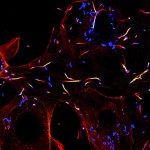Lien vers Pubmed [PMID] – 22566901
Front Immunol 2012;3:16
Classically, allergy depends on IgE antibodies and on high-affinity IgE receptors expressed by mast cells and basophils. This long accepted IgE/FcεRI/mast cell paradigm, on which the definition of immediate hypersensitivity was based in the Gell and Coomb’s classification, appears too reductionist. Recently accumulated evidence indeed requires that not only IgE but also IgG antibodies, that not only FcεRI but also FcγR of the different types, that not only mast cells and basophils but also neutrophils, monocytes, macrophages, eosinophils, and other myeloid cells be considered as important players in allergy. This view markedly changes our understanding of allergic diseases and, possibly, their treatment.

